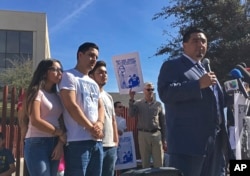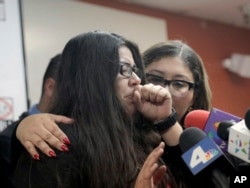U.S. Homeland Security Secretary John Kelly, visiting one of the most fortified stretches of the U.S. border with Mexico Friday, says he would take no “Draconian” measures regarding federal funds for U.S. sanctuary cities.
Kelly met with federal, state and local law enforcement officials late Friday at the border between San Diego, California, and Tijuana, Mexico.
Last month, the Trump administration, which continues its plan to build a wall between the two countries, had said it would cut off federal grants for sanctuary cities — cities and other municipalities that, generally speaking, shelter immigrants in the country illegally by refusing to help the federal government enforce immigration laws.
Near the San Ysidro port of entry, a fence topped with razor wire, a barrier that is often cited as an example of how walls can slow illegal crossings, stands between the two cities. Critics say the wall only forces migrants to move to more dangerous border crossings.
Kelly also toured southern Arizona, until recently one of the busiest corridors for illegal migrants, Thursday. Migrants are now traveling in large numbers through southern Texas, which Kelly visited last week.
The retired Marine general, appointed to lead the Homeland Security Department last month, has said he supports a wall along the border between the southern U.S. and Mexico, as promised by President Donald Trump more than a year ago, during the early days of his campaign for office.
Kelly told senators during his confirmation hearing that a wall, “in and of itself,” would not entirely prevent immigrants from entering the United States. He said the United States also must confront drugs and drug violence in South and Central America, which prompt northward migration.
Mother deported
In another development Friday, Mexico warned its citizens to “take precautions” while in the United States, after an undocumented mother, a longtime resident of the United States, was deported.
Guadalupe Garcia de Rayos was sent back to Mexico Thursday after she stopped to check in at a U.S. immigration office in Phoenix, Arizona — a routine visit that she has carried out every year since 2008.
“The case of Mrs. Garcia de Rayos highlights the new reality that the Mexican community is experiencing in U.S. territory with the stricter application of migration control measures,” the Mexican Foreign Ministry said in a statement late Thursday.
"For this reason, the entire Mexican community is invited to take precautions and keep contact with its closest consulates to receive the necessary help to face this type of situation,” it said.
Rayos had lived for more than two decades in the United States, where two of her children were born. Her deportation sparked protests outside the immigration office in Phoenix.
Number of arrests increase
Immigrants' advocates say there has been increased activity by immigration officials in several cities, including Alexandria, Virginia; Dallas, Texas; and Charlotte, North Carolina, and that about 100 people have been taken into custody in Los Angeles recently. Immigration officials dispute those numbers and say the arrests they made are part of routine activities.
Angelica Salas, executive director of the Coalition for Humane Immigrant Rights of Los Angeles, said she has had over 30 years' experience with Immigration and Customs Enforcement (ICE), and that this is "not normal ICE."
Responding to Trump's repeated pledge that he would build a wall along the Mexican border, and that he would make Mexico pay for the construction, Mexican President Enrique Pena Nieto said that would not happen. He also canceled a planned White House visit because of the wall policy.
‘Buffet of options’
The White House said last month that Trump has a “buffet of options” on how to get Mexico to pay for the wall. However, U.S. officials have said American taxpayers initially would foot the bill for the project, which is expected to cost as much as $15 billion.
Although the stated purpose of a border wall is to stop illegal immigrants from from entering the United States, many Mexicans regard it as an insulting gesture toward their nation. Rough terrain and stretches of private property along the border could make building a wall a long and complicated project.







